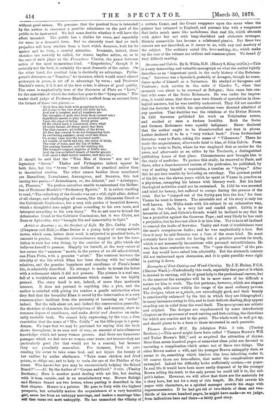CURRENT LITERATURE.
The Wise Alen of Greece, in a Series of Dramatic Dialogues. By John Stuart Blackie. (Macmillan.)—" I have attempted," says Pro- fessor Blackie, in his preface, " to give the general reading public, so far as they may care for wisdom, a living, concrete notion of what the thought of Tholes was in his day to the society of bliletus ; what Pythagoras, with his school of moral discipline, was to Crotona; Xenophanes to Colophon ; and so on with the rest." " So far as they may care for wisdom" is a saving clause, which has not been introduced without good reason. We presume that the poetical form is intended by the author to overcome a possible reluctance on the part of the public to be instructed. We feel some doubts whether it will have the effect intended. The public has a dislike for verse, and especially for verse in a dramatic form. But we sincerely trust that no such prejudice will keep readers from a book which deserves, both for its matter and its form, a careful attention. Dramatic, indeed, these sketches can scarcely be called, for drama implies action, or, as in the case of such plays as the Prometheus Vinctut, the pause between action of the most momentous kind. " Empedocles," though it is certainly not the best, is certainly the most dramatic of the series. On the other hand, the poetical form is decidedly an advantage. Pytha- goras's discourse on " Number," for instance, which would sound almost grotesque in prose, is set off to advantage by verse ; and Professor Blackie's verse, if it is not of the first order, is always of good quality. The same is emphatically true of the discourse of Plato on " Love," for the materials of which the writer has gone to the " Symposium." Tho reader shall judge of Professor Blackie's method from an extract from the former of these two pieces:- " Hold thou this faith with grappling-hooks, All things in the vast world are done by law, And law is number, and all numbers are
The thoughts of gods that from deep counsel take Significant masks to play their pictured parts Upon the stage of being. Every grain Of the ribb'd sand is numbered, every whiff Of every breeze, all fleecy mists that fleck The blue concave, all bubbles of the brine, All flies that swarm from hot-fermenting beds In sweltering summer, every seed that floats On plumy vans into the bosomed earth ; All sounds of earth and sky, the chirp of birds, The roar of lions, and the lisp of babes, The pealing thunder, and the tinkling rill, The trumpet-tongued exploits of dint al war, Aud the low-syllabled breath of fearful prayer, Clod speak s their mystic number, and they are."
It should be said that the " Wise Men of Greece" are not the legendary "Seven." Thaler and Pythagoras indeed appear in both lists, but the " Seven " were inclined to practical rather than to theoretical wisdom. The other names besides those mentioned are Heraclitus, Xenophanes, Anaxagoras, and Socrates, this last having two parts,—" Aristodemus, or, the Atheist," and " Aristippus, or, Pleasure." We profess ourselves unable to understand the Hellen- ism of Professor Blackie's " Dedicatory Epistle." It is rather startling to read, " The orthodoxy of the Greeks was not a stiff, rigid affair, defiant of all change, and challenging all reason, like the Athanasian Creed or the Calvinistic Confessions, but a very rich garden of beautiful flowers, which a thoughtful man might glean according to his own taste, and interpret according to his own fancy." We do not care to defend the Athanasian Creed or the Calvinist Confessions, but it was Christ, not Zeus or Aphrodite, who " brought life and immortality to light."



































 Previous page
Previous page